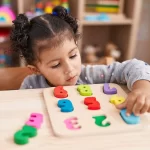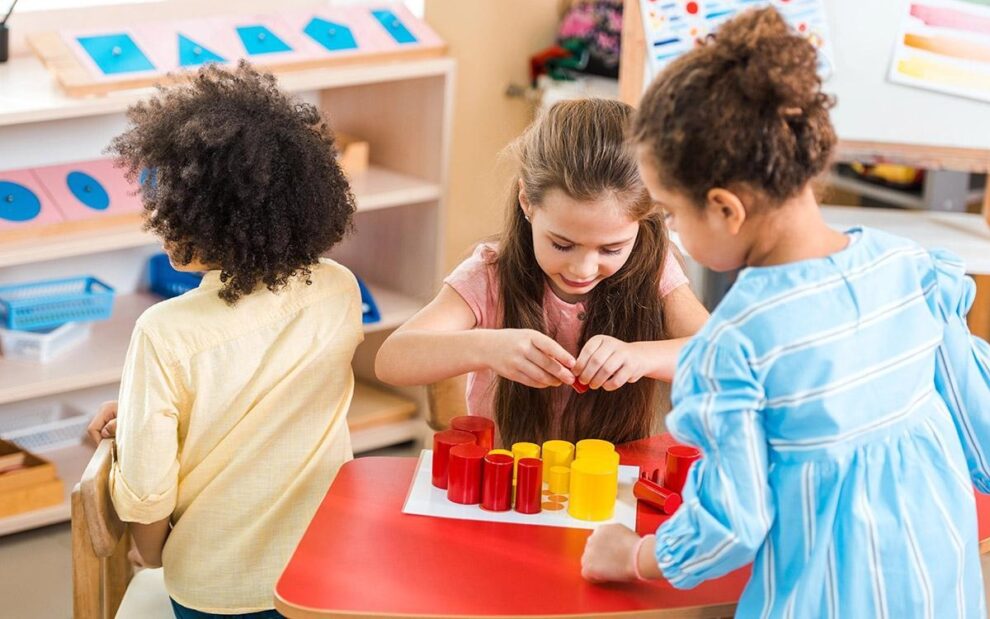How the Montessori approach builds independence, curiosity, and self-motivated learning from the very beginning
Early childhood is a critical period for cognitive, emotional, and social development. During these foundational years, children form the learning habits that influence how they approach challenges, solve problems, and engage with the world around them. At KV Montessori, the classroom environment is intentionally designed to nurture these habits through hands-on exploration, independence, and respectful guidance.
The Montessori method is more than an educational philosophy — it is a research-supported framework that helps children develop intrinsic motivation, concentration, and a lifelong love of learning. This article explores how early Montessori education shapes long-term learning habits and why the approach remains one of the most influential early childhood models worldwide.
“The habits children build in their earliest years often shape the way they learn for the rest of their lives.”
Independence: The Foundation of Self-Driven Learning
One of the core principles of Montessori education is cultivating independence. In a Montessori classroom, children are encouraged to choose their activities, care for their environment, and develop responsibility for their own ntuc learning.
How independence shapes lifelong habits:
• Children gain confidence in their abilities.
• They learn to make choices and follow through.
• They become comfortable tackling new challenges.
• They develop resilience and persistence.
When a child grows up understanding that they are capable, they approach academics and life choices with confidence rather than hesitation.
Hands-On Learning Builds Deep Understanding
Montessori materials encourage tactile exploration and manipulation. This sensory-rich, hands-on approach helps children internalize concepts in a meaningful and lasting way.
For example:
• Counting beads gives children a concrete understanding of quantity.
• Sandpaper letters allow them to trace the shape of each sound.
• Practical life materials develop coordination, sequencing, and focus.
Why this matters long term:
Children who learn through experience develop stronger neural pathways, better memory, and a deeper connection to what they study. They become learners who understand why something works, not just that it does.
Intrinsic Motivation: Learning Because They Love It
Montessori classrooms avoid external rewards such as gold stars, prize boxes, or candy incentives. Instead, the environment promotes internal motivation—children learn for the joy of discovery and accomplishment.
How Montessori builds intrinsic motivation:
• Children choose work that interests them.
• Materials are designed to be self-correcting.
• Teachers observe and guide rather than direct.
• Children experience the satisfaction of mastery.
This intrinsic motivation becomes a lifelong habit. Montessori graduates often approach education, hobbies, and careers with genuine curiosity and enthusiasm.
Concentration and Focus: Skills That Begin Early
One of the most profound benefits of early Montessori education is the development of concentration. When children work with materials they love, they naturally enter periods of deep focus — what Dr. Montessori called “the great lessons of concentration.”
Long-term benefits of developing focus early:
• improved academic performance
• stronger problem-solving abilities
• greater emotional regulation
• increased confidence in independent work
• enhanced ability to manage complex tasks later in life
Modern research strongly supports Montessori’s observations: children who learn to focus deeply at a young age carry that skill into adulthood.
Respect for the Environment and Others
Montessori children learn from the start that their environment matters. They care for their materials, clean up after themselves, and respect the work of others.
These habits influence lifelong behavior:
• responsibility and accountability
• organization and time management
• social awareness
• empathy and cooperation
• stronger interpersonal relationships
Children raised in a respectful environment tend to become adults who value community, collaboration, and meaningful contribution.
A Prepared Environment Encourages Lifelong Curiosity
The Montessori classroom is carefully “prepared” — everything has a place, materials are accessible, and the space invites exploration. This encourages children to follow their interests at their own pace.
This approach prepares them for a lifetime of learning:
• They see learning as an exciting opportunity, not a chore.
• They learn to seek answers independently.
• They become comfortable exploring new subjects.
• They develop the confidence to pursue their own interests.
This habit of joyful curiosity stays with them throughout their lives.
Conclusion
Early Montessori education does more than just prepare children for kindergarten; it also shapes the attitudes and habits that define lifelong learners. Through independence, hands-on exploration, intrinsic motivation, concentration, and respect, children develop the essential tools they need to approach learning with confidence and joy.
At KV Montessori, our prepared environment and trained educators support each child’s natural development, helping them build habits that last a lifetime.To learn more about how KV Montessori nurtures lifelong learning habits, contact our team today or schedule a visit to experience our classroom environment in person.












